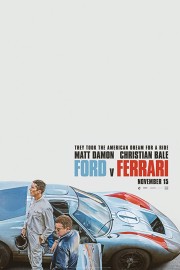Ford v Ferrari
Christian Bale has made a career of playing savants whom stand apart from normal society. Think about his characters in “The Fighter,” “The Big Short,” even Nolan’s “Dark Knight” trilogy and “Empire of the Sun”- they all have something just a bit off from how they view the world that makes them understand a bit differently from everyone else. Ken Miles, the racer he plays in “Ford v Ferrari,” is another example of such a role, and he has such a natural way of getting us into that type of character that we cannot help but be engaged with him.
Miles is not the only main character in James Mangold’s exciting racing drama, though, and not even the one who brings us into the story. That is Carroll Shelby, a racer whose big claim to fame is winning the 24 Hours of Le Mans before retiring to build cars after the Le Mans caused physical ailments that prevent him from racing anymore. When Ford executive Lee Iacocca comes to him to build a race car with Ford that would be capable of beating Ferrari at Le Mans, Miles is the only one he wants to build it with, because he knows Ken has what it takes behind the wheel to win. The only problem is getting his bracing personality past the execs at Ford whom are trying to do what they think is best for the brand rather than the race itself.
I just glossed over quite a bit of the narrative in “Ford v Ferrari,” but that’s the most basic bones of it in the screenplay by Jez and John-Henry Butterworth and Jason Keller. I’m not sure that it merits this film’s 152-minute running time, but Mangold not only makes it move in a flash, but there isn’t a scene here that feels unnecessary for any part of the story being told. I have to admit, I wasn’t a big fan of Mangold’s “Copland” back in ‘97, but almost everything else since has been impressive and entertaining in how he tells each story, whether it’s “Walk the Line” or “3:10 to Yuma” or “Knight and Day” or “Logan.” In due time, “Copland” will be getting another look.
This movie hits a ton of those “underdog sports movie” cliches that get me weak in the critical knees, but what connected with me so much about “Ford v Ferrari” was how Shelby (played terrifically by Matt Damon) and especially Miles have an emotional itch they both have to scratch when it comes to the task in front of them. In one scene, after the IRS has seized his mechanics garage, and he’s faced with an uphill struggle to provide for his wife Mollie (Caitriona Balfe) and son Peter (Noah Jupe), Ken says that he is going to give up racing and focus on providing for his family. But listening to the way Ken tells it, we get the sense that he’s having to give up on the one thing he is passionate about, so that, when Shelby brings this opportunity to him, even Mollie will eventually have to relent and let him do what he loves. (The large sum of money Ford will be paying him may have a role to play.) This passion connected with me, because I feel myself to be a bit at a crossroads, as well, between what I love and what pays the bills. I didn’t expect to be watching the movie when I did, but it’s almost like I was supposed to be, and that’s how this situation feels for Miles and Shelby, who risks his livelihood on Ken’s talent, even when his personality is incompatible with Ford’s image it wants to project. This is one of the most inspirational testings of the sports movie formula I’ve seen in recent years.
On the racetrack is where “Ford v Ferrari” really seals itself as a tremendous piece of filmmaking. From the opening scene of Shelby’s run at Le Mans to the ups and downs of the car’s construction and then the endurance tests Ken finds himself facing on the track, the film is ferociously skilled in how it makes these sequences not just exciting like racing should be, but looks into the mentality of racers. That’s where Mangold flexes his muscles as a director, and makes another triumphant piece of entertainment that has something meaningful to say along the way.










